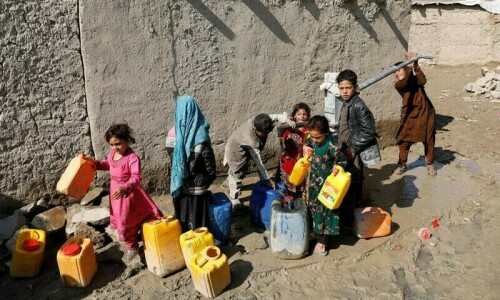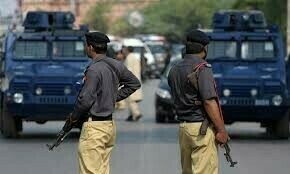AFTER months of silence, we heard from the military’s spokesperson. The televised presser was supposed to be a briefing on counterterrorism efforts and the recent violence in Bannu.
But the talk digressed to ‘digital terrorism’, which Lt-Gen Ahmed Sharif Chaudhry described as the most serious threat to national security. He blamed a ‘certain’ political party and ‘vested interests’ for maligning the security forces. He was also unhappy with the legal system that he said had failed to convict the perpetrators of May 9. The presser turned into an exercise in political polemics, with the general appearing upset at the state of affairs.
But answers are needed as to what has gone wrong with the counterterrorism campaign. The presser took place days after a series of terrorist attacks in KP that have shaken the troubled province. It was one of the bloodiest days for the security forces last week when 10 soldiers were martyred in two separate terrorist attacks in Bannu and Dera Ismail Khan. A number of civilians were also killed. The escalation in terrorist attacks raises questions about our strategy to fight the menace.
Most worrisome, however, was the violent public protest that broke out a day after in Bannu town. The anger over escalating terrorist incidents turned against the security forces. Several civilian casualties were reported in the clashes. According to Lt-Gen Sharif, the incident was orchestrated by a “political lobby” and played up in the digital media.
What happened in Bannu is actually a reflection of the widening trust gap between the public and security forces. Nothing could be worse for a security apparatus, which has been the main target of terrorist attacks, than to confront its own people. Instead of blaming digital media, the reasons for the growing public distrust must be probed. It is apparent that the people are not happy with the way the state has been dealing with militancy. This is an alarming situation for a country that is facing an existentialist threat.
Events in Bannu reflect the widening trust gap between the public and security forces.
The military spokesperson denied that the security forces were planning to launch a new military operation against militant groups. It was stressed that the “purpose of the operation was only to reinvigorate the already in-place National Action Plan”. “Very important issues [are] being sacrificed at the altar of politics,” it was said.
But the fact is that it was the initial statement by the government on launching the counterterrorism operation Azm-i-Istehkam following a meeting of the apex committee that created the confusion. There was certainly no clarity on how the government was planning to deal with domestic security challenges. Contradictory statements by federal cabinet ministers added to the confusion.
It was only after a public outcry and robust opposition from political parties, particularly those in KP, that the government backtracked and announced that there was no plan to launch a full-fledged kinetic operation. It was apparent that it was Beijing’s concerns over terrorist attacks against Chinese nationals working on CPEC projects that had compelled Islamabad to make the announcement about the operation. Now it is doubtful that this changing of stance will help address Chinese concerns.
It is also not clear how the objectives of the counterterrorism campaign, as articulated by Gen Sharif, would be implemented in the absence of a coherent policy. No one knows about the contours of a ‘renewed and reinvigorated National Action Plan’, which is as vague as the previous plan that was framed in the aftermath of the massacre of some 140 students and teachers of the Peshawar Army School by militants.
Almost a decade on, the state has not been able to implement any of those 20 points. Now the miliary is talking about a new and comprehensive national action plan that has yet to be discussed in parliament. Given the worsening political instability in the country and escalating tension between Islamabad and the KP government, one cannot expect the state to effectively fight militancy. The Bannu incident has widened the fault lines. The government has not even tried to develop a broad consensus on a comprehensive counterterrorism strategy, despite the escalating terrorist threat, which has claimed hundreds of lives — of both civilians and security personnel.
With the security establishment so deeply involved in political manipulation, the capacity to deal with grave national security challenges has been greatly weakened. It has also been the reason for increasing public scepticism that was demonstrated in the Bannu protests. It is ironic that a front-line force in the fight against militancy should become the target of public wrath.
While some of the anti-state propaganda on social media may indeed be orchestrated by vested interests, one cannot label criticism of the establishment’s involvement in politics and its questionable actions in suppressing democratic freedom ‘digital terrorism’. What does the establishment have to say about the allegations of harassment of high court judges by intelligence agencies and its alleged interference in the judicial process? Moreover, the footprint of the establishment in the manipulation of the election results is undeniable.
It can hardly be deemed a coincidence that, hours before the presser, the PTI’s central secretariat in Islamabad was raided over accusations that it was orchestrating an anti-state campaign on social media, which the military spokesman describes as “digital terrorism”.
This was a political presser that will only make the security establishment more controversial. One wonders what the purpose of the presser was. The spokesperson’s remarks have serious political implications at a stage when the country desperately needs political temperatures to be lowered in order to deal with the menace of terrorism.
It is apparent that the presser has fuelled political tensions, and left people more confused over the counterterrorism campaign. In this atmosphere, it would not be surprising to see more Bannu-like incidents. It is highly unfortunate for the country, which has to contend with a most serious challenge to its security.
The writer is an author and journalist.
X: @hidhussain
Published in Dawn, July 24th, 2024













































